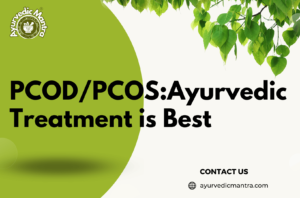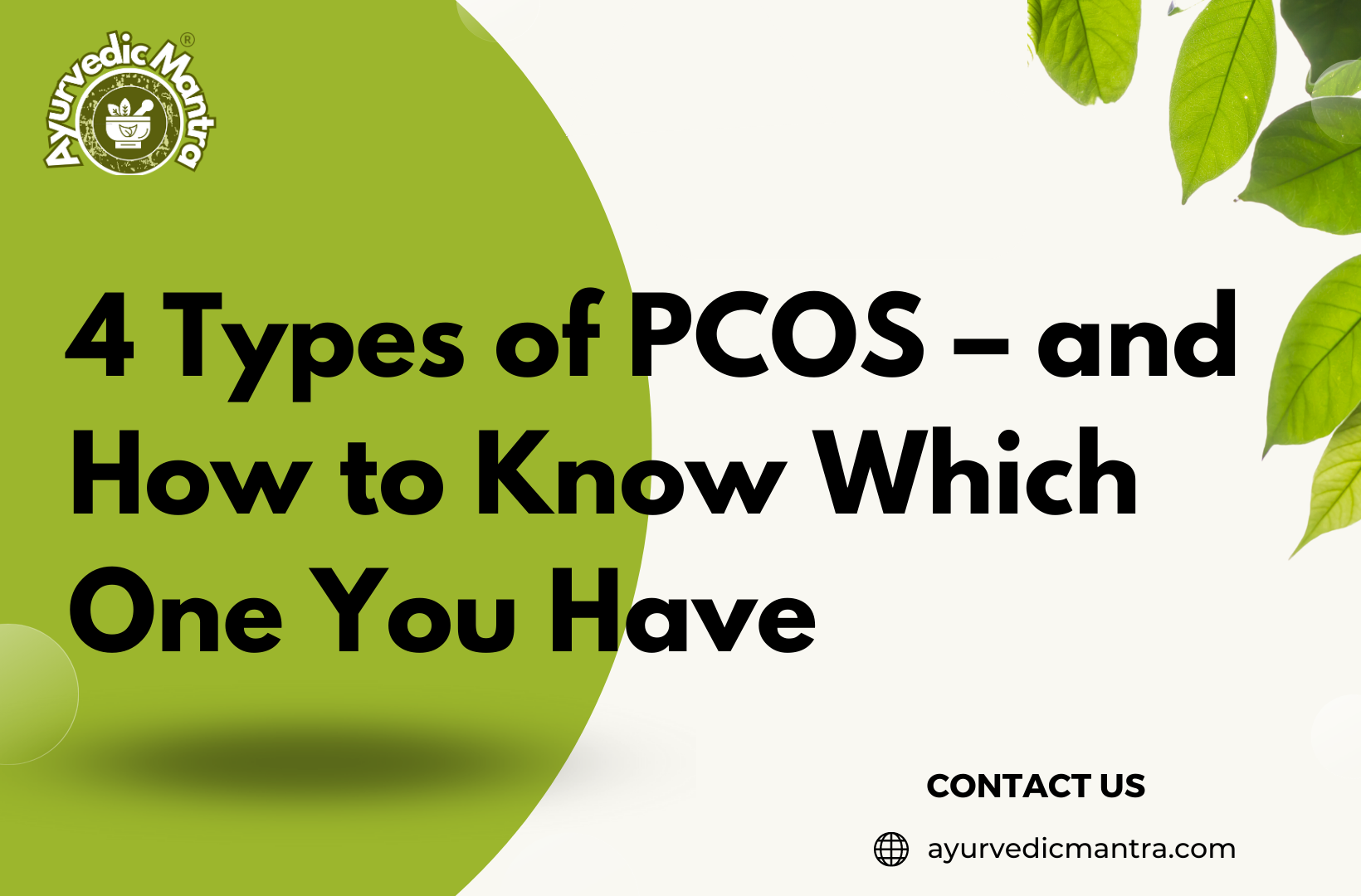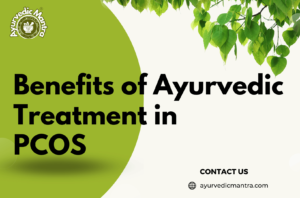
PCOD/PCOS: Ayurvedic Treatment is Best
Introduction Polycystic Ovary Disorder (PCOD) or Polycystic Ovary Syndrome (PCOS) is a common endocrine disorder affecting millions of women worldwide. It leads to hormonal imbalances,


Polycystic Ovary Syndrome (PCOS) is a complex hormonal disorder that affects many women across the globe. It’s not a one-size-fits-all condition; rather, PCOS can manifest in various forms with distinct characteristics and implications. In this comprehensive guide, we’ll delve into the four types of PCOS and provide insights into identifying which type you might have.
As the name suggests, the Root Cause Insulin-Resistant PCOS is closely linked to insulin resistance. This type occurs when the body’s cells don’t respond effectively to insulin, increasing blood sugar levels. High insulin levels stimulate the ovaries to produce excess androgens; the male hormones typically present in smaller amounts in females.
Common signs include irregular periods, weight gain, and skin issues like acne and dark patches. Blood tests can reveal elevated insulin and androgen levels, confirming this type of PCOS.
A Driving Force Inflammatory PCOS is characterized by chronic inflammation in the body. Inflammation disrupts the normal functioning of the ovaries and contributes to hormone imbalance.
Women with this type may experience severe menstrual pain, often accompanied by other inflammatory conditions such as irritable bowel syndrome (IBS) or chronic fatigue. Medical tests might show elevated C-reactive protein levels, indicating inflammation.
Hidden-cause PCOS is less understood but equally significant. It can be triggered by factors such as thyroid abnormalities or high levels of the hormone prolactin.
If you have irregular periods and other symptoms that don’t fit the typical PCOS profile, exploring underlying conditions through thorough medical evaluation is crucial.
Certain hormonal birth control methods, especially those high in progestin, can disrupt the hormonal balance and lead to PCOS-like symptoms. This type is often referred to as Pill-Induced PCOS.
If you began experiencing PCOS symptoms after starting a new birth control regimen, it’s worth discussing these changes with your healthcare provider. Adjustments to your contraceptive method may be necessary.
Remember, identifying your specific type of PCOS is the first step toward effective management. While the road might be challenging, knowledge is power. By unraveling the mystery of your PCOS type, you can work with your healthcare provider to develop a personalized approach that caters to your unique needs. Stay informed, stay empowered, and take charge of your health journey.
Now that you’re equipped with a better understanding of the four types of PCOS and how to identify your own, you’re ready to embark on a path toward tailored care and a brighter, healthier future.
Polycystic Ovary Syndrome (PCOS) is a hormonal disorder affecting women’s reproductive system. It is characterized by irregular menstrual cycles, high levels of androgens (male hormones), and small cysts on the ovaries. PCOS can lead to various symptoms, including irregular periods, infertility, weight gain, acne, and excessive hair growth.
PCOS can be categorized into four main types: Insulin-Resistant PCOS, Inflammatory PCOS, Hidden-Cause PCOS, and Pill-Induced PCOS. Each class has distinct underlying causes and symptoms. Insulin-Resistant PCOS is linked to insulin resistance; Inflammatory PCOS involves chronic inflammation; other underlying conditions trigger hidden-cause PCOS; and Pill-Induced PCOS is caused by certain hormonal contraceptives.
The symptoms of PCOS can vary widely but often include irregular or absent periods, heavy or prolonged menstrual bleeding, acne, oily skin, hair loss, excessive hair growth on the face and body (hirsutism), weight gain, and difficulty losing weight. Infertility and mood changes, such as depression and anxiety, can also be associated with PCOS.
PCOS is typically diagnosed through medical history, physical examination, and laboratory tests. Blood tests are used to measure hormone levels, including androgens and insulin. Ultrasound imaging may be used to visualize the ovaries and check for the presence of cysts.
Yes, PCOS can contribute to infertility. Irregular ovulation and hormonal imbalances can make it challenging for women with PCOS to conceive. However, many women with PCOS can still achieve successful pregnancies with appropriate medical intervention and lifestyle changes.
Treatment for PCOS focuses on managing symptoms and addressing underlying hormonal imbalances. Lifestyle changes are often recommended, such as a balanced diet, regular exercise, and weight management. Hormonal contraceptives, insulin-sensitizing medications, and fertility treatments may also be prescribed based on individual needs.
Women with PCOS are at a higher risk of developing other health issues, such as type 2 diabetes, high blood pressure, cardiovascular disease, and endometrial cancer. Regular health screenings and preventive measures are essential to manage these risks.
While there is no cure for PCOS, certain lifestyle changes and natural remedies can help manage symptoms. These include maintaining a healthy weight, consuming a balanced diet rich in whole foods, managing stress, and incorporating physical activity into your routine. Herbal supplements like cinnamon and spearmint tea may also have potential benefits.
PCOS is a chronic condition, but its symptoms can be managed effectively with the right treatment and lifestyle choices. Regular medical follow-ups, adherence to treatment plans, and ongoing self-care are important for the long-term management of PCOS.
PCOS cannot be completely prevented, as its exact cause is still not fully understood. However, adopting a healthy lifestyle from a young age, maintaining a balanced weight, and managing stress may help reduce the risk of developing PCOS or experiencing severe symptoms.
Understanding the complexities of PCOS and its various aspects is crucial for women’s health and well-being. If you suspect you have PCOS or are experiencing related symptoms, seeking medical advice and early intervention can make a significant difference in managing the condition and improving your quality of life.

Introduction Polycystic Ovary Disorder (PCOD) or Polycystic Ovary Syndrome (PCOS) is a common endocrine disorder affecting millions of women worldwide. It leads to hormonal imbalances,

Introduction Losing weight is a journey that requires dedication, consistency, and self-care. While there are numerous weight loss techniques out there, not all of them

Polycystic Ovary Syndrome (PCOS) is a hormonal disorder that affects millions of women worldwide. It can lead to various health complications, such as irregular periods,

In recent years, Ayurveda, an ancient system of natural healing originating from India, has gained significant popularity as an alternative approach to treating various health

आजकल वजन बढ़ने और चर्बी की वृद्धि होने की समस्या एक आम समस्या बन गई है। बढ़ते वजन और अतिरिक्त चर्बी के कारण न केवल

प्रस्तावना: आजकल वजन बढ़ने और ओबेसिटी की समस्या एक आम समस्या बन गई है। बढ़ते वजन के कारण न केवल शारीरिक समस्याएं होती हैं, बल्कि
